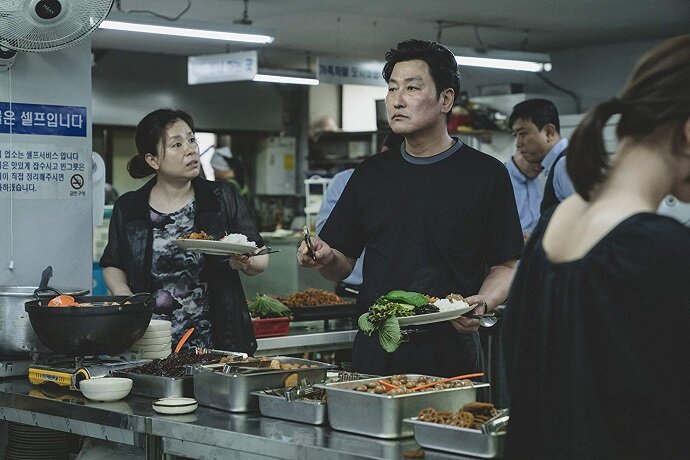#1 – It is a new Bong Joon-ho movie

When you hear that Bong Joon-ho has made a new movie and it is out in theatres (now showing in Singapore!), you ought to drop everything and plan a trip to your nearest cinema as soon as you can.
Bong is one of the finest South Korean directors to emerge since the turn of the century—in fact many critics have regarded him to be the ‘Steven Spielberg’ of Korean cinema for his versatility in making genre pictures that not only entertain but has the requisite substance to match its thrills and spills.
Turning 50 this year, Bong’s most famous genre film is still the monster movie, The Host (2006), which was a huge hit both commercially and critically. He also made English-language movies like Snowpiercer (2013) and Okja (2017).
But Bong’s most remarkable accomplishments remain to be the crime-mysteries Memories of Murder (2003) and Mother (2009), both complex and haunting films dealing with trauma, guilt and violence. Parasite is the closest he has come in many, many years to capturing the brilliance of those two.
#2 – It is South Korea’s first Cannes Palme d’Or winner

Bong Joon-ho with Cannes jury president, Alejandro Gonzalez Inarritu
Very coincidentally, or perhaps this is what destiny is all about, 2019 happens to be the centenary of Korean cinema (yes, it first started in 1919!), and it is also the first time a South Korean movie won arguably the most prestigious film award in the world—the Cannes Film Festival’s Palme d’Or (or Golden Palm).
No South Korean movie or filmmaker has achieved this feat before, though a number of them have come close—in fact last year, Lee Chang-dong’s Burning was widely tipped to be the critical favourite for the Palme d’Or, but sadly did not win. Back in the 2000s, Park Chan-wook’s Oldboy (2003) nabbed the Grand Prize of the Jury (considered 2nd place), while the veteran Im Kwon-taek won Best Director for Painted Fire in 2002.
So, there’s no better way to celebrate Korean cinema’s 100th birthday than to watch its biggest-awarded movie so far. (If you think Palme d’Or winners are meant only for the arty-farty crowd, this is your chance to watch one that is decidedly more mainstream and accessible!)
#3 – Its razor-sharp script about class politics

Parasite is not just entertaining and appealing, but deep within its narrative, there is something that speaks to all of us, especially of today’s current socio-political climate—that of class politics. The film deals with class differences and its political implications, in relation to how society functions and treats these differences.
Bong’s script is so razor-sharp that it brings out these issues to the forefront without sugar-coating anything—in fact, it says a lot about the unbridgeable and contemptuous social gaps between the ultra-rich and the devastatingly poor. But what is most remarkable is how Bong translates these ‘hard truths’ into a twisting and complex urban story that brings both social classes together in the most compelling way imaginable.
#4 – There’s Song Kang-ho, and there’s also…

Seeing Song Kang-ho again in a Bong Joon-ho movie is like seeing Leonardo DiCaprio back in a new Martin Scorsese picture. One of South Korea’s most respected actors, Song plays Ki-taek, the head of a poor, unemployed family struggling to make ends meet in what is another magnetic performance by him.
While the ensemble cast generally produce exemplary work, one particular actress will catch your eye—Jo Yeo-jeong, who plays the wife of the wealthy Mr. Park in a performance that combines innocent aloofness with shy politeness. One of the most interesting aspects of Parasite is seeing her character navigate the dynamics of her family vis-à-vis Ki-taek’s.
#5 – Mastery of tone

The film is a roller-coaster ride of emotions, yet Bong manages to bring everything together seamlessly. One of the most difficult aspects to control in filmmaking is tone, but in Parasite, he manages to dovetail between light comedy and serious drama, or unbearable suspense with plain absurdity.
In the end, it is an unclassifiable work that embeds the personal into the political, and vice versa. And this is perhaps why it is such a satisfying watch because it toys with misdirection and cinematic expectations with aplomb, giving us an unpredictable film to think about deeply for days.
Don’t miss Bong Joon-ho in top form – go catch Parasite in theatres now!





